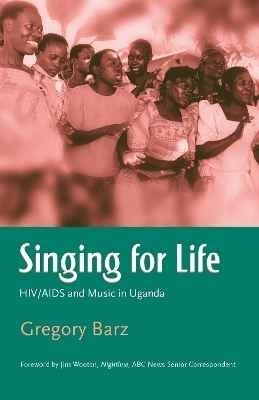
Singing For Life
Routledge (Verlag)
978-0-415-97290-1 (ISBN)
Efforts within the past decade to address the HIV/AIDS pandemic in sub-Saharan Africa have dealt with HIV/AIDS principally as a medical concern—despite the fact that doctors continue to be confronted with the complex relationship of the disease to broader social issues. When medical and governmental institutions fail, artists step in. Contemporary performances in Uganda often focus on gender and health-related issues specific to women and youths, in which song texts warn against risky sexual environments or unprotected sexual behavior. Music, dance, and drama are principal tools of local initiatives that disseminate information, mobilize resources, and raise societal consciousness regarding issues related to HIV/AIDS.
Through case studies, song texts, interviews, and testimonies, Singing for Life: HIV/AIDS and Music in Uganda examines the links between the decline in Uganda’s infection rate and grassroots efforts that make use of music, dance, and drama. Only when supported and encouraged by such performances drawing on localized musical traditions have medical initiatives taken root and flourished in local healthcare systems. Gregory Barz shows how music can be both a mode of promoting health and a force for personal therapy, presenting a cultural analysis of hope and healing.
Gregory Barz is Assistant Professor of ethnomusicology and anthropology at Vanderbilt University. He lives in Nashville, TN.
Foreword by Jim Wooten, Acknowledgments, Acronyms Used in the Text, Recorded Selections on the Compact Disc, List of Figures, Orthography, Prelude: “Those Who Do Not Listen to Our Songs and Change Their Behavior Will Land in Problems”, Introduction: “Music Is Taken as a Medicine”: Singing for Life in a Time of AIDS, Chapter 1: HIV/AIDS, Jackfruit, and Banana Weevils: Music and Medical Interventions in Uganda, Interlude 1: Florence Kumunhyu’s Testimony, Chapter 2: “What You Sing Nourishes Your Body Like Food”, Interlude 2: “Our Problems Are Bigger than AIDS”: A Conversation with Dr. Alex Muganzi Muganga, Chapter 3: “No One Will Listen to Us Unless We Bring Our Drums!”: AIDS and Women’s Music Performance in Uganda, Interlude 3: “Stick to One Person”: Nawaikoke Village Women’s Ensemble, Chapter 4: “Today We Have Naming of Parts”: Languaging AIDS Through Music, Interlude 4: Excerpts from an Interview with the Bukato Youth Fellowship, Chapter 5: “Singing in a Language AIDS Can Hear”: Music, AIDS, and Religion, Interlude 5: Conversation with Faustus Baziri, Chapter 6: Re-Memorying Memory: HIV/AIDS and the Performance of Cultural Memory, Interlude 6: TASO Drama Group Testimonies, Conclusion: “Getting the Message Across Without Music Is Sometimes Shaky”, Afterword, Appendix, Notes, Works Cited, Index
| Erscheint lt. Verlag | 5.1.2006 |
|---|---|
| Zusatzinfo | 1 Tables, black and white; 32 Halftones, black and white; 33 Illustrations, black and white |
| Verlagsort | London |
| Sprache | englisch |
| Maße | 152 x 229 mm |
| Gewicht | 510 g |
| Themenwelt | Medizin / Pharmazie ► Physiotherapie / Ergotherapie ► Ergotherapie |
| Studium ► Querschnittsbereiche ► Infektiologie / Immunologie | |
| Sozialwissenschaften ► Pädagogik ► Sozialpädagogik | |
| Sozialwissenschaften ► Soziologie | |
| ISBN-10 | 0-415-97290-6 / 0415972906 |
| ISBN-13 | 978-0-415-97290-1 / 9780415972901 |
| Zustand | Neuware |
| Informationen gemäß Produktsicherheitsverordnung (GPSR) | |
| Haben Sie eine Frage zum Produkt? |
aus dem Bereich


